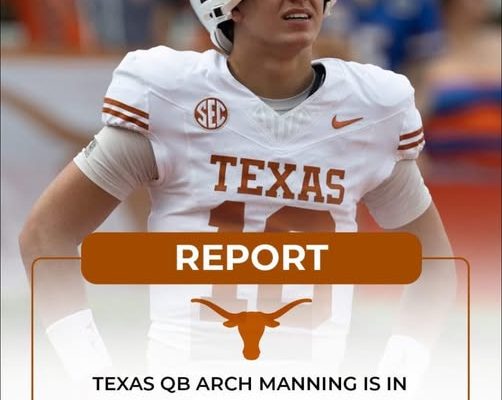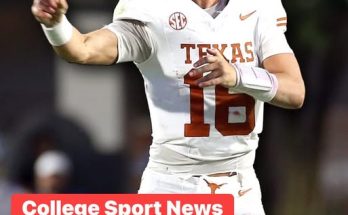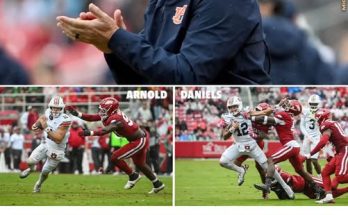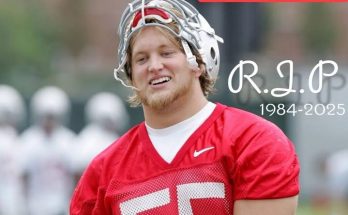The Texas Longhorns received some concerning news this week regarding their star quarterback, Arch Manning, who has officially entered concussion protocol. The announcement came after Manning sustained the injury during Texas’ dramatic overtime victory against Mississippi State, a game that showcased his talent, poise, and resilience under pressure. While the Longhorns emerged victorious, the triumph came at a cost, as Manning is now expected to miss practice this week and sit out the upcoming game against Vanderbilt. This development has sent ripples through the college football community, as the Manning name carries a legacy of quarterback excellence, and Arch is widely regarded as one of the most promising talents in the sport today.
Steve Sarkisian, the head coach of the Longhorns, confirmed the news in a press briefing, emphasizing the importance of prioritizing player safety above all else. Sarkisian highlighted that Manning’s health is the primary concern and that the team will take all necessary precautions to ensure a full recovery before returning him to action. The coach stressed that the Longhorns have confidence in their roster depth and that other players are ready to step up in Manning’s absence, but it’s clear that the team will feel the impact of missing their young quarterback.
Arch Manning’s injury occurred during a game that was emblematic of his composure and skill under pressure. In the overtime clash against Mississippi State, Manning led the Longhorns on a remarkable comeback, engineering key drives that ultimately secured the win. Despite suffering the concussion, he demonstrated resilience and a competitive spirit that has become synonymous with his name. The incident serves as a reminder of the physical demands and risks inherent in football, especially at the highest levels of college competition. Fans and analysts alike have expressed concern for Manning’s wellbeing, noting that protecting a player with his potential is crucial not only for Texas but for the broader landscape of college football.
The concussion protocol in college football is designed to ensure that players who suffer head injuries are monitored carefully and receive the necessary medical attention before returning to practice or games. Manning’s entrance into the protocol means he will undergo a series of evaluations, including cognitive assessments and symptom monitoring, to determine when it is safe for him to resume football activities. This system reflects a growing awareness within the sport of the long-term risks associated with concussions, and the emphasis on player safety has never been more pronounced. For a player of Manning’s caliber, following the protocol meticulously is essential, as rushing back too soon could have significant consequences for both his health and his career trajectory.
The timing of this injury adds an additional layer of complexity for the Longhorns. Coming off an emotional overtime victory, the team had been riding a wave of momentum, and Manning’s presence on the field has been central to their offensive identity. His ability to read defenses, deliver accurate throws under pressure, and lead by example has made him a cornerstone of the Longhorns’ strategy. With him sidelined, Texas will need to adjust its game plan, relying on backup quarterbacks and a supportive offensive unit to maintain performance. Coaches and players alike have expressed confidence in their ability to adapt, but the absence of Manning is undoubtedly a significant challenge.
The news has also sparked broader discussions among college football analysts about the implications of missing a key player like Manning. Texas is a program with high expectations, and every game is closely watched by fans, media, and NFL scouts. Manning’s injury introduces an element of uncertainty, particularly regarding the team’s ability to maintain its offensive rhythm and execute under pressure without its starting quarterback. Yet, it also presents an opportunity for other players to demonstrate their readiness and step into leadership roles. This dynamic can sometimes reveal unexpected strengths within a team, as depth players rise to the occasion in high-stakes situations.
Fans of the Longhorns have shown a mix of concern and support in response to the news. Social media platforms are filled with messages wishing Manning a swift and complete recovery, emphasizing that while winning games is important, the health and wellbeing of players come first. The reaction underscores the deep connection between college football programs and their supporters, as well as the recognition that athletes like Manning are more than just performers on the field—they are young individuals navigating intense physical and mental demands. Public attention on such injuries also helps raise awareness about the broader issue of concussions in sports, which has been a growing topic of concern across professional and collegiate leagues alike.
Medical staff and trainers within the Texas program are expected to work closely with Manning to monitor his progress over the coming days and weeks. The concussion protocol includes daily assessments, gradual return-to-play steps, and a comprehensive evaluation before any decision is made to reintegrate him into practices or games. Coaches have been careful to avoid placing any timeline on his return, emphasizing that rushing recovery could jeopardize his health and long-term potential. This careful approach reflects a larger shift in football culture toward prioritizing player safety over short-term gains, a trend that has become increasingly important as research on head injuries continues to evolve.
While Manning’s absence will undoubtedly be felt, the Longhorns’ coaching staff has emphasized the importance of resilience and team cohesion. Steve Sarkisian has spoken about the “next man up” mentality that defines successful programs, noting that every member of the roster has the ability to contribute meaningfully when called upon. In practical terms, this means that backup quarterbacks will have the opportunity to gain valuable experience in live game situations, and other offensive players will be expected to step up to maintain the team’s competitive edge. For the Longhorns, this period could serve as a test of depth, preparation, and adaptability—qualities that are often decisive in the outcome of a college football season.
The impact of Manning’s injury extends beyond just the Longhorns. Analysts and fans across the country are watching closely, as the performance and recovery of a quarterback with his pedigree can influence rankings, game predictions, and even future draft projections. Arch Manning’s family legacy, which includes some of the most celebrated quarterbacks in NFL history, adds a layer of expectation and scrutiny that few other college athletes experience. Managing these pressures while recovering from a concussion will require both physical care and mental resilience, as Manning navigates a critical stage in his football journey.
Looking ahead, the Texas program must balance optimism with caution. The upcoming game against Vanderbilt will test the team’s ability to execute without their star quarterback, and it will be an opportunity for other players to rise to the occasion. Coaches will likely adjust strategies to accommodate Manning’s absence, perhaps emphasizing the running game, short passing routes, and creative play-calling to maintain offensive production. These adjustments, while necessary, underscore the pivotal role that Manning plays in the Longhorns’ offensive scheme and highlight the challenges of competing at a high level when a key player is sidelined.
In the broader context of college football, Manning’s injury serves as a reminder of the unpredictability and physical intensity of the sport. Every game carries inherent risks, and the health of players is a constant concern for coaches, medical staff, and fans alike. The concussion protocol is an essential safeguard, ensuring that athletes receive the care they need and that teams make informed decisions about their participation. For a player with Manning’s potential, adhering strictly to this protocol is critical for protecting both immediate health and long-term career prospects.
Ultimately, the Texas Longhorns’ response to this challenge will reveal much about the character and resilience of the team. While losing a starting quarterback is never ideal, the program has a history of cultivating depth, preparing players to step up, and maintaining a culture of accountability and perseverance. Manning’s absence will test these qualities, but it also presents an opportunity for other members of the roster to showcase their talent and leadership. Fans, meanwhile, will be watching closely, hoping for both a competitive performance and the safe return of one of college football’s brightest young stars.
As the Longhorns navigate this period, the overarching focus remains on Arch Manning’s recovery. Coaches, medical staff, and teammates are united in prioritizing his health, recognizing that his well-being is paramount. The path forward will require patience, diligence, and careful monitoring, but the hope is that Manning will return stronger, healthier, and ready to continue building on the promising trajectory that has defined his early career. The college football world will undoubtedly continue to follow his progress closely, rooting for both his personal recovery and the sustained success of the Texas program.
In conclusion, Arch Manning entering concussion protocol is a significant moment for the Texas Longhorns, a program, and college football at large. While it presents challenges in the immediate term, it also highlights the importance of player safety, depth, and resilience in the sport. Manning’s recovery will be watched closely by fans, media, and analysts, and his absence provides an opportunity for the team to adapt and demonstrate its capacity to perform under adversity. The story of this injury, recovery, and eventual return will likely be a defining narrative of the Longhorns’ season, underscoring both the physical risks and the enduring excitement that make college football so compelling. As the team prepares for the game against Vanderbilt, all eyes remain on Arch Manning, with hopes high for a full recovery and a triumphant return to the field.



